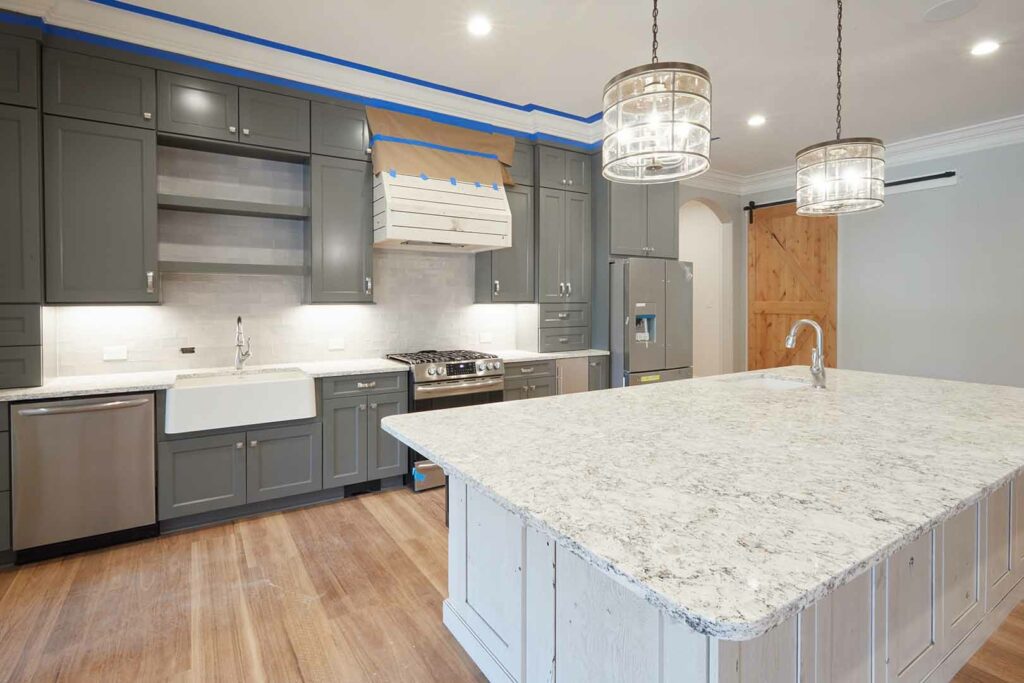When it comes to countertops, there are a lot of choices to make. Do you want granite, marble, quartz, quartzite, or some other material? Each has its own unique benefits. In this blog post, we will compare quartz and granite in particular to help you decide which is the best choice for your home.
Quartz Vs Granite
Quartz is an engineered stone that is made from natural quartz crystals. Quartz is around 90% ground quartz, a natural mineral found in the earth, and 10% various resins, polymers, and pigments. The raw materials are mixed together and poured into a long, flat, rectangular mold. From here, the materials are compressed by a large machine in order to form quartz slabs. Essentially, all the tiny pieces of quartz mineral and resin are forced together under immense pressure so that they become one large solid object (a slab of quartz). Once all of that compression is done, the quartz is dried and then “baked” in hot machines that use heat and pressure to fully solidify the quartz and ensure that the surface is smooth. Polishing then occurs to give the quartz a beautiful finish. Quartz countertops are non-porous and do not require sealing. They are also more resistant to scratches, stains, and chipping than granite countertops. However, quartz countertops can be more expensive than granite countertops.
Granite, on the other hand, is a natural stone that is mined from the earth. It is an igneous rock that develops through the cooling of magma or lava. The block of granite is then cut into slabs and polished for use in countertops. Granite is one of the strongest and most durable stones, and it is resistant to scratches, stains, and heat damage. However, granite is a porous material. This means that, if it is not properly sealed, liquid is able to penetrate its surface. If liquid or stains get down into the stone, it can result in damages and weakening of your granite. As a result, it must be sealed on a regular basis to prevent staining and reduce the chance of damage. Granite does not crack under ordinary and common use, but can crack if under pressure or hit by something heavy.
Benefits of Quartz
As we mentioned earlier, quartz countertops are non-porous and do not require sealing. They are also more resistant to scratches, stains, and chipping than granite countertops. Quartz is a low-maintenance material that is easy to clean. It is also available in a wide range of colors and patterns.
Benefits of Granite
Granite is a strong and durable material that is also resistant to scratches and stains. Since granite is a natural material, every granite countertop is unique because no two slabs of granite are the same. This beautiful natural stone is a high-quality feature that can add value to your home.
What’s the Difference in Appearance of a Quartz and Granite Countertop?
Quartz countertops have a more uniform appearance. The color and pattern are consistent throughout the countertop. Granite countertops have a natural, veined appearance. Most granite countertops are packed with rich, naturally forming patterns that make every kitchen and bathroom surface look unique. Veining can be subtle or dramatic, as they are created by different minerals that are found in the granite. Regardless, both types are beautiful options for your home.
Which Countertop Is More Durable?
Quartz countertops are non-porous and do not require sealing. Granite is a very strong and durable material, but it is porous. This means that it can stain easily if it is not sealed on a regular basis. While both are strong countertop materials, quartz tends to be more resistant to scratches, stains, and chipping than granite countertops.
Which Countertop Is More Expensive?
In general, quartz countertops tend to be more expensive than granite countertops. However, the price difference will vary depending on the quality of the materials used and the brand.
Which Countertop Is Better For Your Home?
The best countertop for your home depends on your personal preference and needs. If you want a non-porous countertop that provides extra protection against scratches and stains, then quartz is a good choice. If you want a natural stone that is strong and durable, then granite might be right for you. Ultimately, the decision comes down to what you value most in a countertop and whether you mind the extra maintenance required by granite countertops.
Which Countertop is Easier to Maintain?
As mentioned earlier, quartz countertops are easier to maintain because they do not require sealing. Granite countertops must be sealed on a regular basis to prevent staining.
Which Countertop is More Heat Resistant?
Granite is more heat resistant than quartz. However, both materials can withstand high temperatures.
Quartz Vs Granite: Which is Right For You?
Both quartz and granite are strong and durable materials that are available in a wide range of colors and patterns. Quartz countertops are non-porous and do not require sealing. They are also more resistant to scratches, stains, and chipping than granite countertops. Granite is a strong and durable material that is resistant to scratches and stains. However, granite is a porous material, so it must be sealed on a regular basis to prevent staining. Ultimately, the decision of which countertop to choose depends on your personal preference and needs. If you’re still struggling to make a decision, speak with a countertop specialist such as Amanzi Marble & Granite. We’ll be happy to discuss your needs and help determine which is the right material for your home.
Amanzi Marble & Granite is a leading provider of countertops in Kernersville, NC. We carry a wide selection of marble, granite, quartz, and quartzite countertops. Contact us today to learn more about our products and services!




